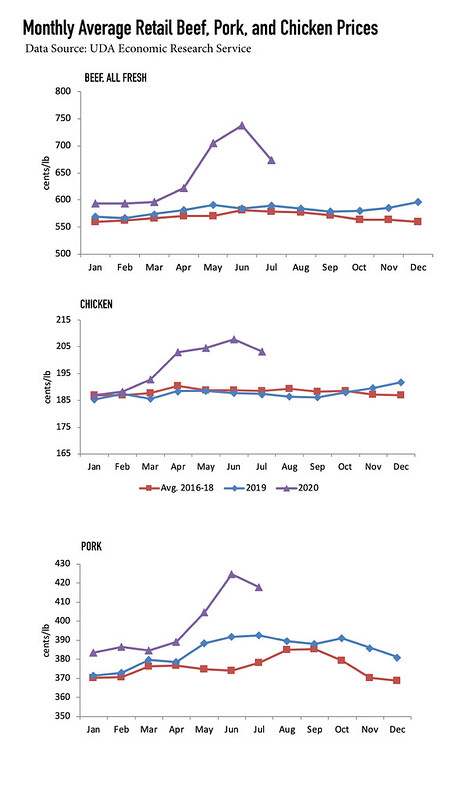Aug. 21, 2020
Meat processing regains ground after COVID disruptions, prices dipping
By Mary Hightower
U of A System Division of Agriculture
Fast facts
- Beef, pork processing getting back on track
- Prices receding from pandemic peaks
(396 words)
(Download this story in MS Word format here.)
FAYETTEVILLE, Ark. — As the nation’s meat processing regains ground stolen by COVID-19 disruptions, prices for beef, chicken and pork are retreating, according to an analysis from the University of Arkansas System Division of Agriculture.
John Anderson, head of the agricultural economics and agribusiness department of University of Arkansas System Division of Agriculture and the Dale Bumpers College of Agricultural Food and Life Sciences, based the analysis of the U.S. Agriculture Department’s Economic Research Service report of Aug. 12 on meat retail prices.
Anderson said the average retail price for all beef, chicken and pork dropped fairly sharply in July from June levels.
“Significant month-to-month declines in retail meat prices are unusual; but, of course, these are unusual times,” he said, noting that “retail meat prices had climbed rapidly in May and June, largely reflecting the temporary product shortages due to COVID-related processing plant disruptions. These disruptions resulted in record-high wholesale prices which, in turn, fueled sharp increases in retail prices,” Anderson said.
However, the declines are relative. July retail beef, pork, and chicken prices were still 13.6 percent, 8.2 percent, and 8.0 percent higher, respectively, than they were in February, before COVID-related impacts began to significantly affect the retail meat market.
Processing claws back
Still, Anderson said it’s likely that retail meat prices will continue to decline for another month or so as processing plant volumes largely returned to pre-COVID levels.
“In fact, weekly pork processing volumes have approached 10 percent higher than year-ago levels in most weeks since the end of June,” he said. “Beef processing volumes have generally been within a percent or two of year-ago levels over that time period.”
While beef industry might like to see a faster pace to work through a backlog of market-ready cattle, “it is quite an accomplishment under the circumstances, though; and it has been sufficient to return wholesale beef prices to pre-COVID levels,” Anderson said.
He said chicken processing remains the furthest from attaining prior-year volumes.
“The weekly chicken processing volume hasn’t matched the prior year level since early April. In most weeks since the end of June, chicken processing has been three or four percentage points lower than the prior year,” he said. “This chronic slowdown in production may limit further declines in retail chicken prices over the next couple of months, though competitive pressure from beef and pork may still be sufficient to result in further price declines.”
To learn about extension and research programs in Arkansas, visit https://uada.edu/, Follow us on Twitter at @AgInArk, @uaex_edu or @ArkAgResearch.
About the Division of Agriculture
The University of Arkansas System Division of Agriculture’s mission is to strengthen agriculture, communities, and families by connecting trusted research to the adoption of best practices. Through the Agricultural Experiment Station and the Cooperative Extension Service, the Division of Agriculture conducts research and extension work within the nation’s historic land grant education system.
The Division of Agriculture is one of 20 entities within the University of Arkansas System. It has offices in all 75 counties in Arkansas and faculty on five system campuses.
Pursuant to 7 CFR § 15.3, the University of Arkansas System Division of Agriculture offers all its Extension and Research programs and services (including employment) without regard to race, color, sex, national origin, religion, age, disability, marital or veteran status, genetic information, sexual preference, pregnancy or any other legally protected status, and is an equal opportunity institution.
# # #
Media Contact: Mary Hightower
Chief Communications Officer
University of Arkansas System Division of Agriculture
mhightower@uada.edu
501-671-2006
